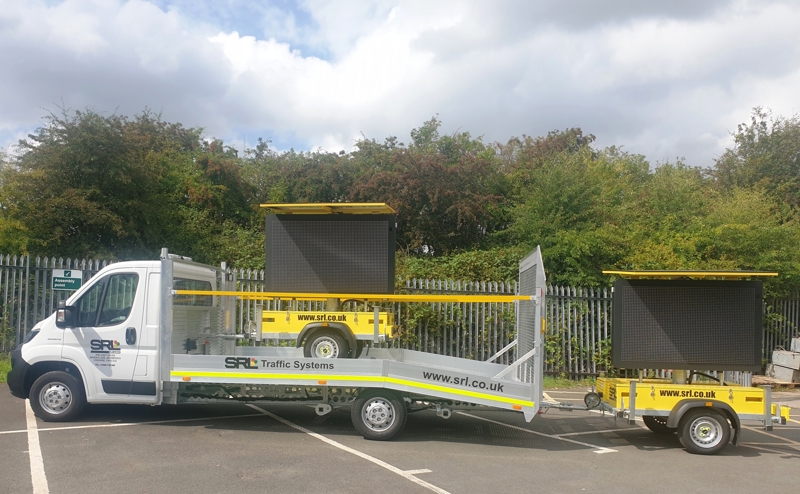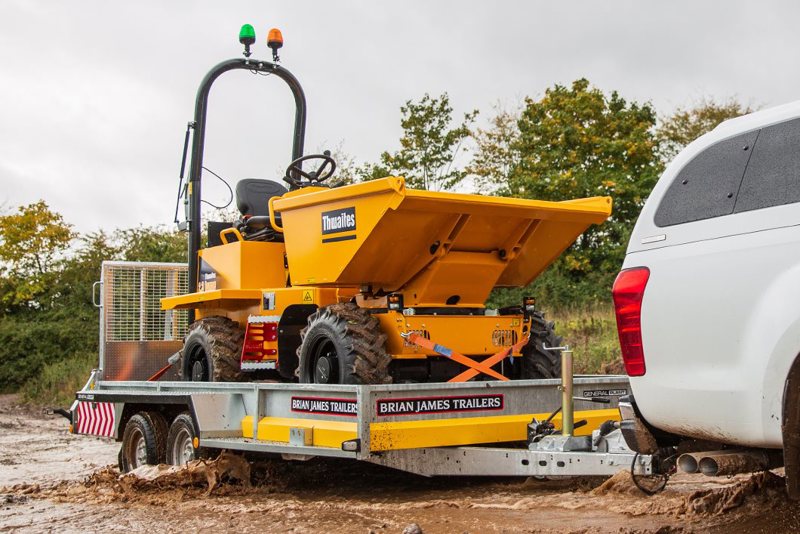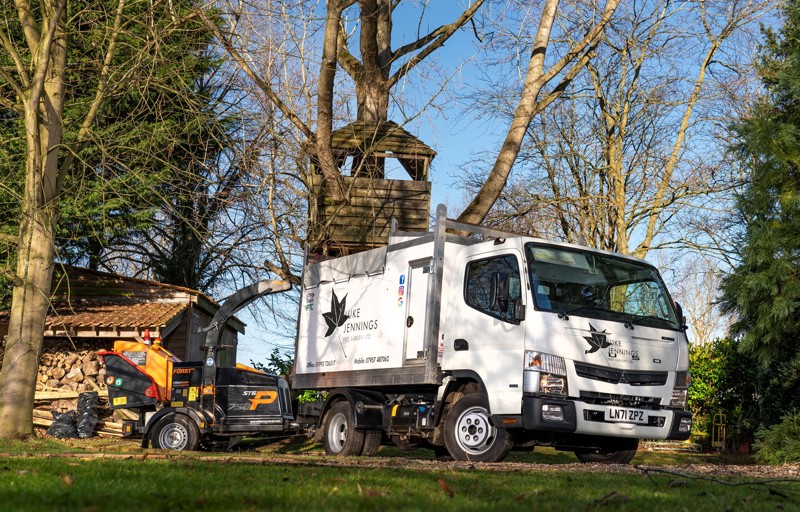
On the face of it using a 3.0- or 3.5-tonner to haul a heavy trailer laden with goods that tips the scales at, say, two tonnes looks like a simple-enough activity.
The driver will obviously have to allow for the extra length when entering a roundabout or emerging from a side street onto a main road.
They will also have to bear in mind that the additional weight will mean a longer braking distance, and they need to take care when backing up.
Surely that's all a fleet manager has to worry about?
Unfortunately not, because deploying a trailer in the way outlined above takes the vehicle concerned above the all-important 3.5-tonne threshold, and straight into a complex cat's cradle of demanding regulations.
That is the case even though the combined gross weight of the light commercial and trailer combination under discussion here is unlikely to exceed seven tonnes.
Potentially the regulations that apply include the need to hold an O-licence.
An O-licence is not needed if the total gross weight of the vehicle/trailer combination does not exceed 3.5 tonnes says Logistics UK or, if neither the vehicle nor the trailer displays a Department for Transport (DfT) plate showing their permitted gross weight, their total unladen weight does not exceed 1.525 tonnes.
If no DfT plate is present then the relevant plated weight is the maximum authorised mass shown on the manufacturer's plate, Logistics UK points out.
"Note that maximum gross weight and maximum authorised mass are terms used in different legislation, but both have the same meaning," it adds.
If a business is using such a combination to haul its own goods, however, then a small trailer does not have to be taken into consideration when making the unladen weight calculation, Logistics UK adds.
Goods Vehicles Act
The Goods Vehicles (Licensing of Operators) Act 1995 defines a small trailer as one with an unladen weight not exceeding 1,020kg.
So what happens if the combined gross weight of the vehicle and trailer exceed 3.5 tonnes?
Suppose that a van grossing at three tonnes is used to pull a trailer with an unladen weight of a tonne and a gross weight of two tonnes.
If the combination is being used to transport goods belonging to a third party - used for hire or reward work, in other words - then an O-licence is required, says Logistics UK.
If it is used to haul goods belonging to the operator concerned - on own-account work, in other words - then it is not, even though the combination grosses at five tonnes. That is because the small trailer exemption applies.
What if the 3.0-tonner is used to pull a trailer with an unladen weight of 1.2 tonnes and a gross weight of 2.0 tonnes?
Then an O-licence is needed, says Logistics UK, no matter whether hire-or-reward or own-account work is involved because of the unladen weight of the trailer.
How about if a van grossing at three tonnes with an unladen weight of 1.7 tonnes is hooked up to a trailer with an unladen weight of 1.2 tonnes?
Then an O-licence is obligatory no matter what the combination is used for because the unladen weights total at above 1.525 tonnes, and the trailer is big enough to be included in the calculation.
If the permitted gross train weight - the maximum weight a trailer and the vehicle towing it can operate at, in other words - of a combination exceeds 3.5 tonnes, then you are required to fit and use a tachograph and comply with the EU Drivers Hours rules. They still apply even though the UK has left the European Union.
There are exemptions from both the O-licence and tachograph regulations, including vehicles operated by the armed forces, for example.
"The EU Drivers Hours rules do not apply if, for example, the trailer is being used to carry tools, equipment and materials used by the driver in the course of his or her work and the driver is within 100km of home base," says Percy Thrower, manager – dangerous goods information at Logistics UK.
"Nor do they apply if, for instance, it is travelling from door to door and being used to collect household waste, or engaged in flood defence work."

Licence to tow
Happily there is now one less complication for fleet managers to worry about, Logistics UK points out.
Since November 15, 2021, anybody with a Category B car driver's licence has been allowed to tow a trailer grossing at up to 3.5 tonnes with a light commercial grossing at up to 3.5 tonnes.
Before that date only drivers who had passed their car test prior to January 1, 1997, were permitted to do so.
Drivers who obtained their licence since then had been obliged to take a separate test to obtain a category BE entitlement if they wanted to haul a trailer grossing at above 750kg with a 3.5-tonner.
Bear in mind that while the driving licence entitlement you hold may allow you to tow a 3.5-tonne trailer, limits are imposed on how much weight the towing vehicle is allowed to pull by the manufacturer.
They can vary considerably from one derivative to another within the same model range.
A Ford Transit Custom, for example, can pull anything from 1,500kg to 2,800kg depending on which version you pick, so it pays to check with the manufacturer or the supplying dealer.
The licensing change means that more drivers are towing who have never done so before.
As a consequence, the Driver & Vehicle Standards Agency (DVSA) has set up a voluntary training scheme for those who wish to burnish their towing skills.
Anybody who wants to find a course or a training provider should contact the NRI Trailer Training Accreditation Service (lgvinstructorregister.com), the Safe Towing Scheme (safetowingscheme.co.uk), or Skills for Logistics (skillsforlogistics.co.uk).
The National Trailer and Towing Association (NTTA) is unhappy that such training is optional. "We'd like to see it made mandatory," says Sarah Smithurst, senior business development manager.
If you wish to haul a trailer with a vehicle grossing at up to 3.5 tonnes then you are not required to hold a driver's Certificate of Professional Competence.
Light trailers do not attract Vehicle Excise Duty and are not subject to a regular MOT test.
They still need to be serviced regularly however, an exercise which mainly involves periodically checking the lights, the tyres and, where fitted, the brakes.
“A trailer can only be towed on the public highway in a fit and legal state,” says Smithurst.
"We would advise that a trailer should be serviced every 12 months/3,000 miles, although a lot depends on how much it is being asked to carry.”
Typically grossing at above 750kg, a trailer built on or after October 1, 1982, must be fitted with a safety device in case it parts company with the towing vehicle.
Usually this means a breakaway cable. Attached to both the towing vehicle and trailer, it goes taut and applies the latter's brakes if the trailer breaks loose.
Once it has done so, the cable will part. Hopefully the wayward trailer will then come to a halt a short distance from the vehicle that was pulling it.
Speed limits
Do not forget the speed limits that apply if a light commercial driver is towing a trailer and the combination exceeds 3.5 tonnes.
They are 60mph on unrestricted motorways and dual carriageways and 50mph on other unrestricted roads.
The NTTA points out that drivers are not allowed to travel in the outside lane of a motorway with three lanes or more if they are towing a trailer.
It adds that if the towing vehicle grosses at up to 3.5 tonnes then the trailer must be no more than 7m long, excluding the coupling and drawbar, with a maximum width of 2.55m. There is no legally-imposed height restriction.
The towing vehicle should be fitted with a Type Approved tow bar.
A growing number of electric light commercials are allowed to tow trailers. Their environmentally-beneficial zero-emission status has been rewarded by regulators by, for example, increasing the 3.5-tonne O licence threshold that would otherwise apply to 4.25 tonnes to compensate for the weight of their battery pack.
Their rated towing capacity may be less than that of their diesel stablemates, however, because of the extent to which towing a heavy trailer drains batteries.
Note that if you are based in England, Scotland or Wales and are travelling to an EU member state on hire or reward work, then you will need to hold a standard international O licence if your light commercial grosses at over 2.5 tonnes.
This also applies if your vehicle and trailer are operating at a combined gross train weight of more than 2.5 tonnes.

Securing loads
Properly securing a load to a trailer is as important as securing a load to the vehicle towing it. This is especially important if the trailer is an open-backed one because of the risk that anything it carries will tumble off.
The Health and Safety Executive points out that the Road Traffic Act 1988 and the Road Vehicles (Construction and Use) Regulations 1986 both oblige fleets to secure loads in such a way that they do not present a danger to any person.
This may, for example, involve the use of load restraint chains or straps and the operator must ensure that both they and any cargo tie-down points on the trailer they are attached to have sufficient capacity to keep the load in place.
The DVSA has produced a document entitled Load securing: vehicle operator guidance which states: "The combined strength of the load restraint system must be sufficient to withstand a forwards force not less than the total weight of the load to prevent the load moving under severe braking, and half the weight of the load moving backwards and sideways.
“Heavy loads can and do move and the weight of the load alone should never be relied on to hold the load in place."
Fleet managers and their drivers should be aware of how much weight a trailer is allowed to carry, and ensure that it is not overloaded. If in doubt, then take the combination to a public weighbridge.
Remember that overloading can result in an immediate prohibition notice being issued by the enforcement authorities preventing the vehicle from going any further until the excess weight is removed.
It can also result in the operator being prosecuted for causing or permitting the offence; with substantial fines on conviction.
By John Lewis



















Login to comment
Comments
No comments have been made yet.